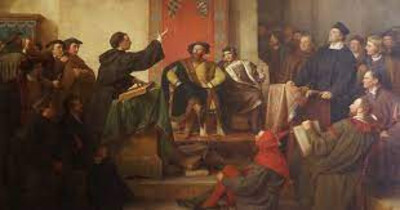Luther's position is firm. He is entrenched. Upon posting his Theses, he has been attacked and accused of heresy by the Catholic Church, but he has not budged. Though this was difficult for him personally, it was a necessity for the church. Things were beginning to change.
In addition to Luther's conviction that salvation comes through faith alone (sola fide), in his arguments with the authorities he took the position that it is Scripture alone (sola Scriptura), not popes or councils, which is the authority that establishes doctrine. This became very clear in an 18-day long debate with German Catholic theologian, Johann Eck. This debate, held in 1519, became known as the Leipzig Debate as it was held in the German city of Leipzig.
Eck's attacks on Luther centered mainly on Luther's refusal to accept the positions and rulings of the Pope and of the early church fathers as definitively authoritative. Eck asserted that the pope was the head of the church. Luther refuted by quoting Scripture. Where Paul, speaking of Jesus and quoting from the Old Testament says, "For He must reign until He has put all His enemies under His feet" (I Corinthians 15:25). Meaning that Jesus reigns over God's kingdom even now, not only in the heavenly kingdom yet to come.
Eck continued. He sought to bolster his argument using quotes from Cyprian, Jerome and Augustine. He is quoted to have said of Luther, “I am surprised at the humility and modesty with which the reverend doctor undertakes to oppose, alone, so many illustrious Fathers, and pretends to know more than the sovereign pontiffs, the councils, the doctors, and the universities!" But Luther never waivered. His appeal remained with the authority of Scripture, something which no one can sufficiently refute.
Eventually, Eck himself appealed to Scripture, claiming that Jesus' words in Matthew 16:18, "And I tell you, you are Peter, and on this rock I will build my church, and the gates of hell shall not prevail against it" meant that Peter himself and all who followed (popes) were authorized by Jesus to be the rock, the foundation upon which the church is built. But this interpretation of the Catholic Church is easily debunked as well, as Paul says in I Corinthians 3:11, "For no one can lay a foundation other than that which is laid, which is Jesus Christ."
They eventually argued over a number of other things including the heretical teachings of purgatory and indulgences, Luther's approach never changing. Scripture rules.
After 100's of years of darkness, praise God, the light was beginning to dawn! "The people who walked in darkness have seen a great light; those who dwelt in a land of deep darkness, on them has light shone." (Isaiah 9:2)
Pastor Jeremy


